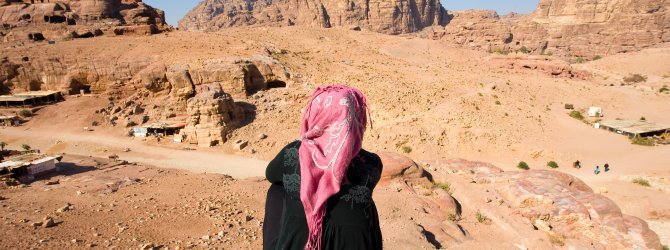-
Sustainable Natural Resource Management: Islamic ...
Sustainable Natural Resource Management: Islamic Perspectives

Convergence and unity between natural sciences and social sciences is needed to inform and reform the discourse for water and land management. Harnessing the core values of Islam can inspire a fresh narrative that can inform a new model for sustainable water and natural resources management. The early hydraulic civilizations in the WANA region maintained a balance between humans and nature before they reached tipping points or collapse due to loss of ecological insight.
The Islamic worldview presents an interactive and integrated outlook on sustainability and human civilization. The intent of law (maqasid) sets a framework for public policy analysis and for devising trade-offs between public and private interests. Islam also provides new perspectives for explaining and addressing the root causes of the current environmental crisis as manifested in climate change, poverty and human security. Islamic thought looks upon the challenges of the twentieth century as a crisis of values. It realizes the need to re-examine the foundations on which the entire structure of society is built. The crisis in economic and political relations is the natural outcome of values and institutions that characterize modern civilization.
It is believed that with a thorough understanding of the social values of Islam, value-oriented communities can develop creative and innovative approaches to sustainability using Waqf, Hima, Revival of arid land (Ihya’ ard al mawat) and Green bonds (sukuk). The message is timeless and the principles that Islam embodies are of universal application, addressing the core notions, principles and approaches of sustainability and prosperity.
The Arab region is constrained by interlinked insecurities within the water-energy-food nexus. The population of the Arab region in 2010 is estimated at over 359 million and is expected to reach 487 million by the year 2025. This will naturally increase the demand for water and land resources, while rapid urban migration will add water stress on the cities of the region as well. Over 55 percent of the region’s population lives in cities, and urbanization trends are being observed in Egypt, Lebanon, Morocco, the Syrian Arab Republic and Tunisia, largely due to reduced income and employment opportunities in the agricultural sector and the burgeoning youth demographic.
In the WANA region, both poverty and wealth can be a root cause for resource degradation and over-exploitation due to consumption patterns and life styles. In an arid climate, financial capital can be harnessed to develop water resources, such as the desalination of seawater in Gulf countries. The key question is how to revive development approaches like Hima and Waqf as innovative and relevant models of sustainability and human-centered development.
The Islamic worldview offers a holistic approach to natural resources management that implements the value system and development models on the ground. The ultimate purpose of shari’ah is to seek the welfare of all because each element of creation serves an ordained role by contributing to the cosmic design and purpose (emart al ard).
The key principles for ensuring sustainable natural resources management are: unity, trusteeship, and accountability. In essence, Islam looks at the environment from the standpoint of balance. Three aspects of the Islamic way of life – environmental consciousness, simplicity, and empathy – have important bearing on the maintenance of environmental balance. These principles provide substance to the concept of good life (Hayat Tayebah), and it is the notion of what constitutes good life that is crucial to sustainability.
The collective action and social choices of the ‘median community’ (Ummah wassat) is underpinned by being and doing good, and not causing harm or injury to any living or non-living entity. The principle of 'no injury' (darar) implies an obligation to take action against activities causing harm or injury to society and nature. Moreover, respect for nature and responsible development are enshrined in Islamic laws relating to the importance of cultivating barren public lands:
"Whoever revives barren lands is entitled to what he has revived."
Islamic laws also encourage water conservation, participation, plantation and afforestation, and discourage deforestation. The principle underlying this prohibition can be extended to cases relating to the security of general habitat. This is contextualized by the al Hima system (a form of protected area). Al Hima emerged as a response to the need to promote co-existence between humans and nature. This social innovation, inspired and informed by local culture, was developed through human reasoning, experimentation and innovation (ijtihad). Al Hima is a good example of a human-centered development model where the human is viewed as a trustee and a witness who is responsible for the “construction of the world” (Emmarat Al-kawn). In sum, it is imperative to revive development models rooted in local cultures. Al Himas can be sustained and resourced by community-based financing models like Waqf (trust funds) and Green sukuk. The al Hima is undoubtedly one of the most important conservation practices of Islam and must be revived through adaptive management and community-based natural resource management structures.
In essence, the stagnation in global idea generation is an impediment to developing ecosystem restoration and resilience. Lack of empathy and respect for nature is a human-made fire that can destroy the wealth of our ecosystems and forests that are our pharmacies, playgrounds, classrooms and sources of inspiration. We need to be mindful that we cannot invest in a dead planet.
About the Author:
Professor Odeh Al-Jayyousi is an independent consultant in sustainability, water and environment. He was the vice president for science and research at the Royal Scientific Society (RSS) in Jordan from 2011 t0 2013. He was the Regional Director for IUCN – The International Union for Conservation of Nature - West Asia / Middle East regional office from 2004 to 2011. He was Dean of Research and a Professor in civil engineering at the Applied Science University in Amman from 1994 to 2004. He is a founding board member of the Jordan Green Building Council, and a member of the Advisory Board for the MSc program in IWRM between Cologne and Jordan University. He published a book, “Islam and Sustainable Development”, In the UK in 2012. Additionally, Dr Al-Jayyousi has been a consultant to WB, USAID, GIZ and UN agencies. His research interests include sustainability and culture, innovation and technology, water policy and planning and environmental management. E-mail: odjayousi@gmail.com. Mobile: 0777888355.

